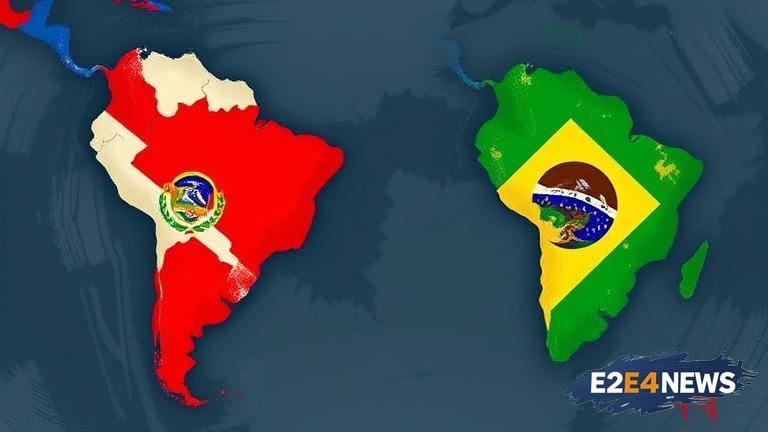The Mercosur trade bloc, comprising Argentina, Brazil, Paraguay, and Uruguay, is facing significant challenges in the wake of rising global tensions and economic shifts. The region’s economies are heavily reliant on exports, particularly agricultural products and commodities, which have been impacted by the ongoing trade wars and protectionist policies. Furthermore, the bloc’s internal dynamics have been strained by disagreements over trade policies and economic integration. Argentina, in particular, has been struggling with high inflation and a large fiscal deficit, which has led to a decline in investor confidence. Brazil, on the other hand, has been pushing for greater trade liberalization and integration with other regions, including the European Union. The Mercosur-EU trade agreement, signed in 2019, has been hailed as a major breakthrough, but its implementation has been slow due to concerns over agricultural subsidies and market access. Meanwhile, Paraguay and Uruguay have been seeking to diversify their economies and reduce their dependence on traditional trade partners. The region’s economic growth has been sluggish in recent years, with the IMF forecasting a modest expansion of 2.5% in 2025. Despite these challenges, the Mercosur bloc remains an important player in global trade, with a combined GDP of over $2.5 trillion. The region’s strategic location, bordering the Atlantic and Pacific Oceans, makes it an attractive hub for international trade and investment. However, the bloc’s infrastructure and logistics networks require significant upgrades to improve efficiency and competitiveness. The rise of China and other emerging markets has also created new opportunities for Mercosur countries to diversify their trade relationships and reduce their dependence on traditional partners. Nevertheless, the region’s economies are vulnerable to external shocks, including fluctuations in global commodity prices and exchange rates. To mitigate these risks, the Mercosur countries have been seeking to strengthen their economic ties with other regions, including the Pacific Alliance and the Association of Southeast Asian Nations (ASEAN). The bloc’s economic integration has also been driven by the need to improve competitiveness and attract foreign investment. The creation of a single market and customs union has been a key objective, but progress has been slow due to disagreements over trade policies and regulatory frameworks. Despite these challenges, the Mercosur bloc remains committed to deepening economic integration and promoting regional trade and investment. The region’s governments have been working to improve the business environment, simplify regulatory procedures, and enhance infrastructure and logistics networks. The private sector has also been playing a crucial role in driving economic growth and investment, with many companies seeking to expand their operations in the region. However, the bloc’s economic growth has been uneven, with some countries performing better than others. Argentina, in particular, has been struggling to recover from a severe economic crisis, while Brazil has been driving growth through investments in infrastructure and innovation. The Mercosur bloc’s economic challenges have also been compounded by rising social and political tensions, including protests and strikes in several countries. The region’s governments have been seeking to address these concerns through policies aimed at reducing poverty and inequality, but progress has been slow. The Mercosur bloc’s future prospects will depend on its ability to navigate these challenges and capitalize on emerging opportunities, including the growing demand for sustainable and renewable energy sources. The region’s economies are well-positioned to benefit from the transition to a low-carbon economy, with many countries possessing significant renewable energy resources. However, the bloc’s governments will need to invest in education and training programs to develop the skills required for the transition to a more knowledge-intensive economy. The Mercosur bloc’s economic integration will also require greater cooperation and coordination among member countries, including the development of common policies and regulatory frameworks. The region’s governments have been working to strengthen their economic ties with other regions, including the European Union and the Pacific Alliance, but progress has been slow due to disagreements over trade policies and market access.
